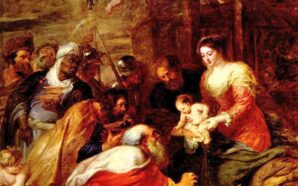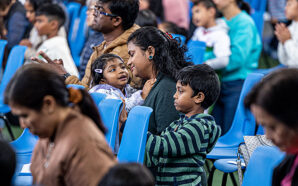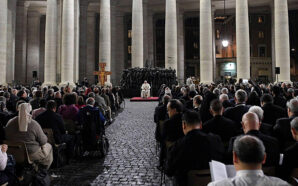Homily for the 3rd Sunday of Advent
Readings: Isaiah 61:1-2A, 10-11; Luke 1:46-50, 53-54; 1 Thessalonians 5:16-24; John 1:6-8, 19-28
During the week I celebrated my 38th anniversary of ordination as a priest. I was ordained in St Stephen’s Cathedral, Brisbane, at the age of 31, a fairly typical age for the ordination of a Jesuit. This past week we celebrated the 175th anniversary of the arrival of the first two Jesuit priests in Australia. They were the Austrians Frs Kranewitter and Klinkowstrom who accompanied a boatload of 275 Prussian Silesian immigrants who had come to the other side of the world seeking a better life. Kranewitter was aged 31 on arrival in Adelaide, having been ordained only a few weeks before he had set sail. He had long desired to be missioned to that country in the world most in need of priests. Never would he have imagined that it might be Australia. When the Jesuits arrived on 8 December 1848, “The first thing we noted was the sand with its mussels and cockles, and then the plant life, all new and unknown to us. Not a shrub, plant or tree like those of home, except perhaps the red stock-gilliflower that grew wild in the sand ridges.”
Listen at https://soundcloud.com/frank-brennan-6/homily-171223
The Jesuit bishop Greg O’Kelly preached at the anniversary mass last weekend. He noted: “It was an audacious act for Jesuit superiors to send two men, ordained only six weeks, ‘to the other end of the earth’, as they said, on a journey that took four months at sea. It was an act of trust, that they join as chaplains a group hoping to establish a German Catholic settlement of farmers and villagers in a land totally foreign to them in government, topography, religion and language. It was the early days of the Church in this land. Our first bishop had arrived just on three years earlier, to find neither church nor chapel, nor residence, and only one priest in the colony.”
Within a short time, Fr Klinkowstrom fell ill and returned to Europe, leaving Fr Kranewitter on his own until two Jesuit brothers arrived. There are times when I look back over my 49 years as a Jesuit in Australia, despairing that our number has declined from 300 to 100 since I joined, and that decline is likely to continue. But whatever our number, we can always draw inspiration from those pioneers like Kranewitter and the immigrants he accompanied. They came to the other side of the world and established a thriving Catholic community around Sevenhill in the Clare Valley. They triumphed against all the odds.
Four years ago when Bishop O’Kelly laid down his crozier on the altar, concluding his appointment as bishop of the Port Pirie diocese, all Jesuit houses in Queensland, the Northern Territory, the ACT, and Western Australia had been closed. A time of contraction and diminishment was upon us. I am delighted that in the new year, I will accompany two other Jesuits to open a new Jesuit community in Queensland. This Advent the words from the prophet Isaiah ring a note of hope and promise, especially as we prepare for the next stage of our Synod:
The spirit of the Lord God is upon me,
because the Lord has anointed me;
he has sent me to bring glad tidings to the poor,
to heal the broken hearted,
to proclaim liberty to the captives
and release to the prisoners,
to announce a year of favour from the Lord
and a day of vindication by our God.
The Synthesis Report of the recent Synod session in Rome reminds us of the need to include in our church life “men and women who have an apostolic disposition, distinguished not by their frequent presence in church, but by a genuine evangelical witness in ordinary life. The People of God are all the more missionary when they can make the voices of those already living the mission by inhabiting the world and its peripheries resonate within themselves”[1].
This past week, we also celebrated another anniversary – the 75th anniversary of the Universal Declaration of Human Rights. Pope Francis marked the occasion at the end of last Sunday’s Angelus when he said: “Seventy-five years ago, on 10 December 1948, the Universal Declaration of Human Rights was signed. It is like a master plan. Many steps have been taken, many still need to be made, and unfortunately, at times, steps backward have been taken. The commitment to human rights is never finished! In this regard, I am near all those who, without fanfare, in concrete daily life, fight and personally pay the price defending the rights of those who do not count.”[2]
During the week I participated in a webinar with the Vincent de Paul Society marking this anniversary. I observed that there is no group in our Church who better match Francis’s description than the faithful Vinnies workers who constantly attend to those most in need – those Vinnies members “who, without fanfare, in concrete daily life, fight and personally pay the price defending the rights of those who do not count.”
Human rights talk is easily cheapened or misused simply to push the latest populist agenda. Even some of the strongest human rights advocates conveniently overlook the Universal Declaration’s that “In the exercise of their rights and freedoms, everyone shall be subject only to such limitations as are determined by law solely for the purpose of securing due recognition and respect for the rights and freedoms of others and of meeting the just requirements of morality, public order and the general welfare in a democratic society.”[3] But particularly when considering the entitlements and deprivations of the First Australians and the most recent arrivals seeking asylum, the language of human rights can help us to counter the majoritarian instinct to short change those minorities on the peripheries.
In his valedictory speech from the Parliament last month, Senator Patrick Dodson, reflecting on the loss of the Voice referendum and setting down the challenge for future generations, said that “we must proceed from here under a human rights framework agenda. We can begin that journey by implementing the United Nations Declaration on the Rights of Indigenous Peoples, UNDRIP.” He said, “If these three things—social reform, human rights and the adoption of UNDRIP, and an economic program for independence for First Peoples—can be achieved, or at least embarked upon, then we will be able to contribute to a more substantive way of dealing with the reconciliation process and its challenges. It’ll be far more meaningful for all of us, because everyone benefits. It’s not just the First Peoples who would benefit. And it’ll be far better than what we’ve had to date.”[4] Human rights talk is not enough on its own. Man does not live on human rights declarations. But human rights together with the common good and economic independence provide the basis for a good life enhancing the dignity of all. As the Universal Declaration of Human Rights puts it: “Recognition of the inherent dignity and of the equal and inalienable rights of all members of the human family is the foundation of freedom, justice and peace in the world”[5].
Taking up the theme of Mary’s Magnificat we pray this response to the anniversaries of this past week – the arrival of the first two Jesuits in our land 175 years ago, and the Universal Declaration of Human Rights one century later:
My soul rejoices in my God.
My soul proclaims the greatness of the Lord;
my spirit rejoices in God my Savior,
for he has looked upon his lowly servant.
From this day all generations will call me blessed:
My soul rejoices in my God.
The Almighty has done great things for me,
and holy is his Name.
He has mercy on those who fear him
in every generation.
My soul rejoices in my God.
He has filled the hungry with good things,
and the rich he has sent away empty.
He has come to the help of his servant Israel
for he has remembered his promise of mercy,
My soul rejoices in my God.
Fr Frank Brennan SJ is the Rector of Newman College, Melbourne, and the former CEO of Catholic Social Services Australia (CSSA). Fr Frank’s latest book is An Indigenous Voice to Parliament: Considering a Constitutional Bridge, Garratt Publishing, 2023.
[1] XVI Ordinary General Assembly of the Synod of Bishops, First Session, A Synodal Church in Mission: Synthesis Report, pp. 35-6.
[2] https://www.vatican.va/content/francesco/en/angelus/2023/documents/20231210-angelus.html
[3] Article 29.2, Universal Declaration of Human Rights.
[4] Senate, Hansard, 29 November 2023, p. 32.
[5] Preamble, Universal Declaration of Human Rights








